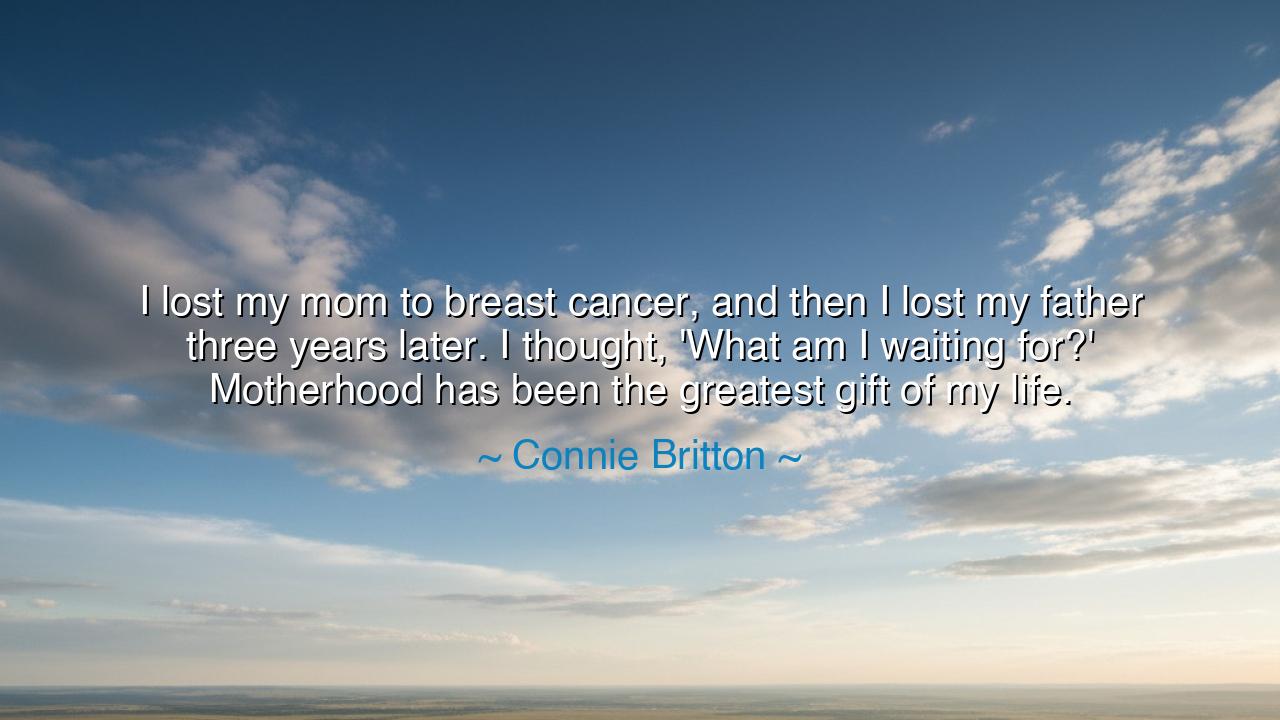
I lost my mom to breast cancer, and then I lost my father three
I lost my mom to breast cancer, and then I lost my father three years later. I thought, 'What am I waiting for?' Motherhood has been the greatest gift of my life.






The words of Connie Britton, “I lost my mom to breast cancer, and then I lost my father three years later. I thought, ‘What am I waiting for?’ Motherhood has been the greatest gift of my life,” are born from the sacred intersection of grief and renewal. They carry the echo of sorrow, yet shine with the light of rebirth. In her voice, we hear not only mourning, but awakening — the realization that life, fragile and fleeting, must be embraced while it is still ours to live. This quote is not merely about loss or even motherhood; it is about the eternal rhythm of endings and beginnings, the mysterious way in which pain can become purpose, and absence can become the seed of love’s renewal.
When Connie speaks of losing her mother and father, she reveals the deepest human wound — the loss of those who gave us life. Such losses mark the heart like fire. They strip away illusion, leaving only truth: that time is finite, and that waiting for the “right moment” is often the greatest mistake of all. Her awakening — the question, “What am I waiting for?” — is the cry of a soul that has looked into the face of mortality and found courage instead of despair. Through this, she reminds us of an ancient truth: that death, though cruel, can be a teacher, urging the living to act, to love, and to fulfill what the heart yearns for before it is too late.
Motherhood, to her, is not just a role — it is redemption. It is the turning of grief into creation, of emptiness into nurturing. When she calls it “the greatest gift,” she does not speak of ease or sentimentality. She speaks of the gift of giving — of channeling her pain into something sacred and alive. In ancient philosophy, this act was seen as transmutation, the alchemy of the soul: to take suffering and refine it into compassion, to take loss and shape it into love. Like the mythic Phoenix, Connie rose from the ashes of her parents’ deaths not by denying her pain, but by transforming it into a new life she could nurture — her child, her purpose, her continuation of the love that had once nurtured her.
History, too, tells us of those who found renewal through loss. When Queen Victoria lost her beloved Prince Albert, she fell into years of mourning, her spirit nearly broken. Yet out of her grief emerged a renewed devotion to her people, a sense of duty that shaped an empire. Her love, though wounded, found another form of expression — one that served generations. Likewise, Connie’s motherhood became a continuation of her parents’ legacy, an act of remembrance that defied oblivion. In raising a child, she did not simply move on; she carried forward the love that had once raised her, ensuring that what death had taken, life would give again.
The phrase “What am I waiting for?” is perhaps the most powerful part of her confession. It is the question that every mortal soul must one day face. How often do we postpone our dreams, believing that tomorrow will be more certain than today? Yet death, in its silent wisdom, reminds us that the only time we truly own is the present. Connie’s realization is the same truth that Marcus Aurelius, the Stoic philosopher, wrote centuries ago: “Do not act as if you had ten thousand years to throw away. Death hangs over you. While you live, while you can, be good.” Her decision to embrace motherhood was not impulsive, but clarifying — the moment when fear bowed to love, and hesitation surrendered to life’s urgency.
Through her experience, Connie Britton becomes a teacher of emotional courage. She shows that even in the shadow of tragedy, one can choose to create rather than collapse, to open the heart rather than close it. To become a mother after such loss is to stand defiantly before death and declare, “You cannot end me, for I will give life again.” That is the spirit of resilience that has carried humanity through centuries of sorrow — the will to rebuild when the world falls apart. Her story reminds us that grief, when faced with bravery, does not diminish us; it expands us, deepening our capacity for love.
The lesson, then, is this: when life strips you bare, do not hide from its pain. Let it awaken you. Let it sharpen your sense of what truly matters. Do not wait for perfect conditions, for they may never come. Act upon the longings that stir your heart — to love, to create, to forgive, to begin anew. For even in the ruins of loss, there lies the possibility of rebirth. Connie Britton’s journey from orphaned daughter to mother is a map of this sacred transformation: that through the valley of grief, the soul may discover the summit of meaning.
So remember, dear listener, that the greatest gifts of life often arrive through the door of sorrow. When you lose, do not despair; when you fall, do not remain fallen. Let your pain remind you that you are still alive, and therefore still capable of giving love. For as Connie’s story teaches, it is not death that defines us — it is what we choose to do after it visits our lives. And if, like her, you find the courage to turn loss into creation, then you, too, will have touched the divine rhythm of existence — where endings become beginnings, and love, even after death, continues to bloom.






AAdministratorAdministrator
Welcome, honored guests. Please leave a comment, we will respond soon